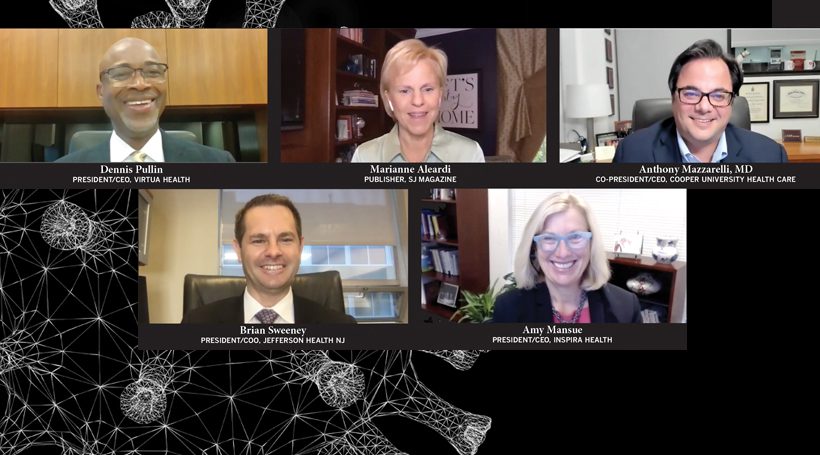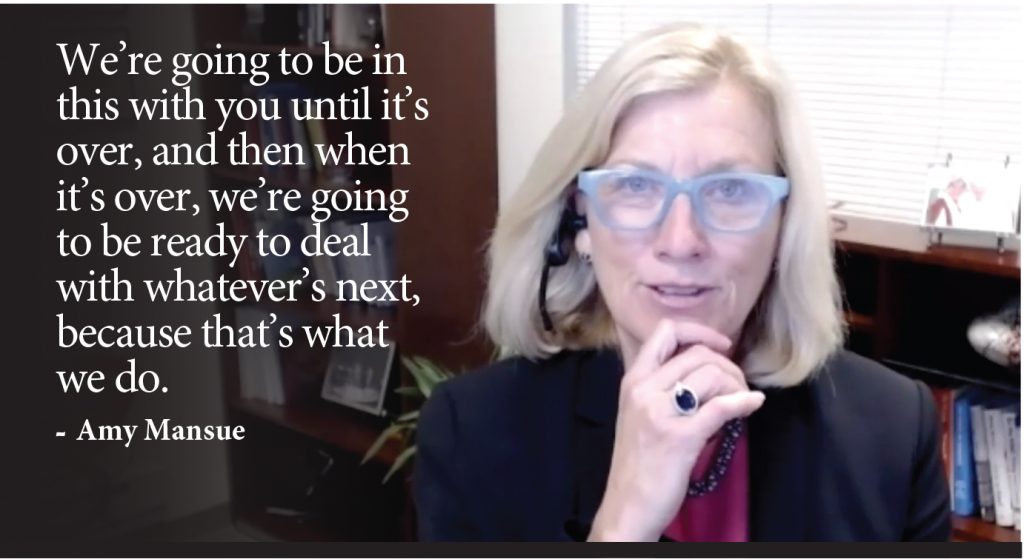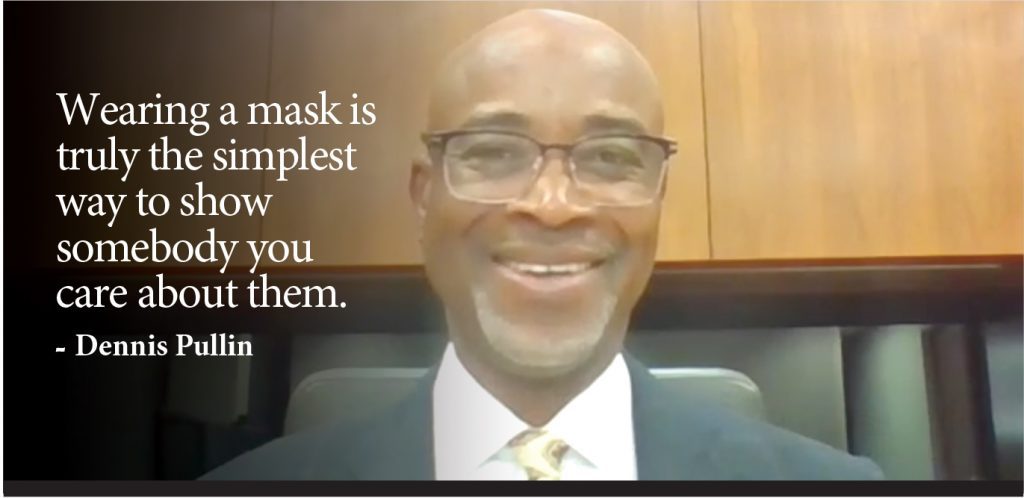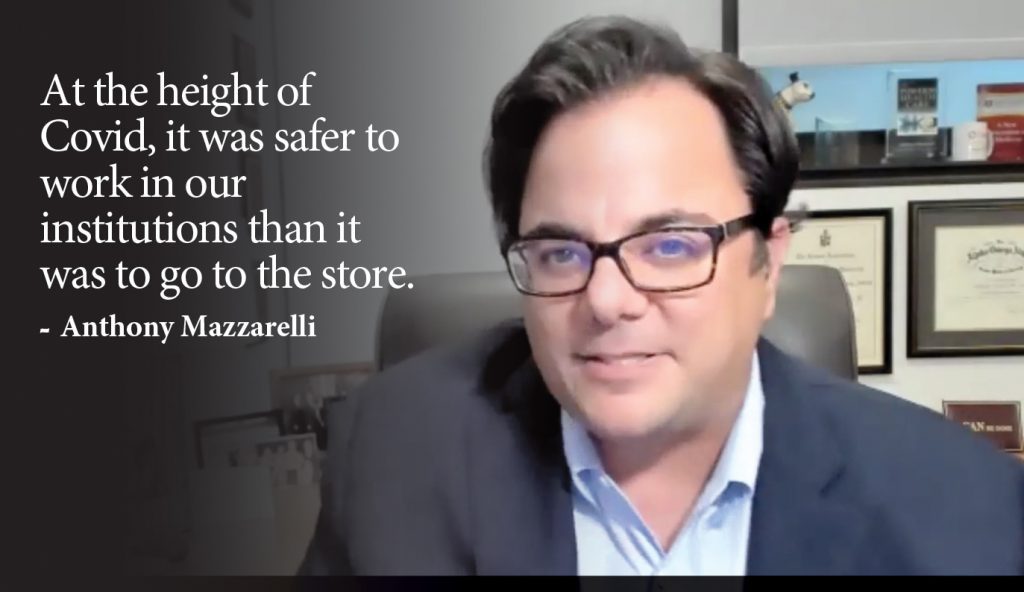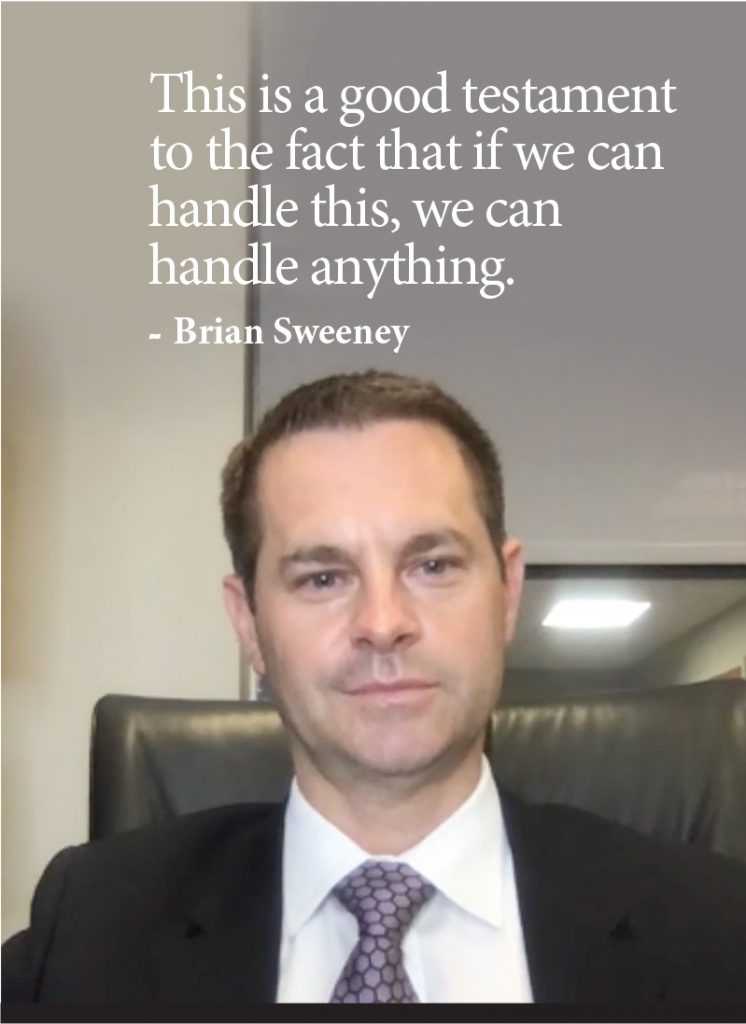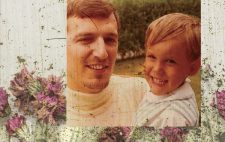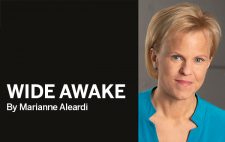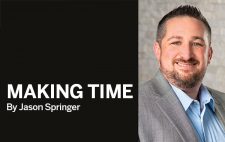Presented by
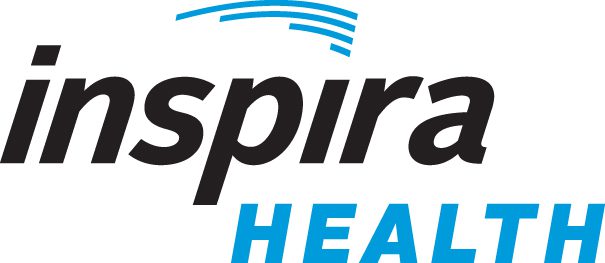
We were honored to have the CEOs from our local healthcare systems join us again for an end-of-year roundtable that was interesting, informative and much needed – as South Jersey (and the world) contends with its largest health crisis in recent times. When the conversation began, it was easy to see these respected leaders fully understand the challenges they continue to face, and they have a clear vision of what it takes to keep us all healthy and safe. None of them have easy jobs, but all of them love what they do. Because when they are successful, South Jersey residents are cared for. At a time when we seem to be living in chaos, their calm, knowledgeable voices are important. We’re thankful they are letting us share their thoughts with you.
Marianne Aleardi, Publisher, SJ Magazine
Amy Mansue, President/CEO, Inspira Health
Anthony Mazzarelli, MD, Co-President/CEO, Cooper University Health Care
Dennis Pullin, President/CEO, Virtua Health
Brian Sweeney, President/COO, Jefferson Health – NJ
On the new surge in Covid cases…
People are tired of this, so they’re starting to let their guard down. This virus isn’t going anywhere and we need to maintain our vigilance. The good news is we’re not seeing an impact in our ICUs in the same way we did before. The bad news is more and more people are being impacted, increasing the risk to those who are most at-risk.
Amy Mansue
The challenge is making sure we can continue to provide non-Covid healthcare services. We can’t do what we did last time and just shut down for a while and not provide services for an unknown time period.
Anthony Mazzarelli
The reality is that there’s not an immediate treatment or vaccine. And who knows what the acceptance will be with vaccines? We have all accepted the fact that Covid is going to be with us for a while.
Brian Sweeney
On Covid’s other tolls…
A lot of us are very closely connected to the community, and it’s been hard to do a lot of the things we do with outreach and education over Zoom. We’ve had to get really creative. We’ve had some drive-by health fairs, and that’s going well, because there still is some connection and appropriate safety mechanisms can be put in place.
Brian Sweeney
We had one specialty, only one, where during the pandemic, even at its height, visits went up. It was our addiction services. It’s the epidemic within the pandemic.
Anthony Mazzarelli
What’s happening now is that people are not only social distancing, they’re medically distancing. As a result, they’re showing up to our emergency rooms much sicker. I would love for that confidence that our institutions are all very safe places to return.
Dennis Pullin
The mental drain on everybody cannot be underestimated. Nothing is the same anymore. We can’t hug or kiss our parents anymore. There are things you just long for, and it wears on you.
Amy Mansue
On staying healthy…
Wearing a mask shouldn’t be a debate. It’s one of the simplest things that helps to save lives. I don’t think there’s a person on this panel who will tell you there should be an issue with masks.
Dennis Pullin
There’s little to no fighting over whether you should cover your mouth when you sneeze or cough, right? As far as I know, nobody struggles with the idea of whether we should all wear pants. That’s socially acceptable. Masks should be along the lines of all of those things that are acceptable and non-partisan. It’s frustrating that it’s taken on this deeper meaning.
Anthony Mazzarelli
If everybody follows the basic precautions of social distancing, masking and washing their hands, it will help us manage through this surge.
Brian Sweeney
Get your flu shot. It’s not going to cure Covid, but it is going to protect you from the flu. And the flu continues to kill people each year, just not at the same rate as Covid.
Amy Mansue
On their work at the height of covid…
Even when you left, you didn’t leave. You were still on and in contact with people, still trying to navigate the journey. Then you had your life at home. What I think probably happened for all of us is we had loved ones and friends who stepped in for us because we couldn’t be at home in a way that was needed, and also be present at work in a way that was required.
Amy Mansue
Most people think of this period as a time where everyone was home. My wife is a cardiologist and was part of the team that was seeing patients during this time, so our household during the shutdown was very different than many other households. Our memory of this time is going to be at work and trying to make sure we were doing what we could for our people. While it was super intense, I think it is going to be a highlight of some people’s career from a medical aspect.
Anthony Mazzarelli
We had to pivot and manage quite often on an hour-by-hour basis, or a day-to-day basis, which is a little different than what we had been conditioned to do. It required us having some of the slack picked up elsewhere by family members, or redistributing workload amongst other colleagues. It was, and still is, a very different environment.
Dennis Pullin
On technology…
Once technology goes in one direction, there’s no going back. We all had to accelerate many of our digital activities that we may have planned to do. At Virtua in 2019, we had 5 billable telehealth visits. To date, in 2020, we’ve had 125,000.
Dennis Pullin
We have an app, and so we were able to push out information. A lot of the team members are clinical and not at their computer, so they don’t have the luxury of time to look at long emails. But coming up with concise information, bullet points that they could get on their phone or their iPad, was really critical because the playbook was changing literally day to day.
Brian Sweeney
The shift to behavioral health through telehealth has been a tremendous gift. We used to have a very large no-show rate, and we don’t have that anymore. People are keeping those appointments. I’m hopeful that the silver lining here is the ability for us to continue successfully providing those telehealth services, and really making that much easier for people. Hopefully this will put aside some of the stigma that exists.
Amy Mansue
There’s been other innovations that were on all of our roadmaps. One of them is to have a completely touchless experience. On your phone you could check in, pay your copay, get your after-visit summary, or fill out your forms, all without touching anything. That touchless experience is going to stay. It’s better, because Covid isn’t the only disease you can get from touching things and not washing your hands.
Anthony Mazzarelli
On PPE shortages during covid…
We were getting all these phone calls and emails from various people who were claiming to have supplies, and asking us to wire them money. So on top of trying to manage the real issue, we had to manage fraud and abuse. The FBI was involved. It was like nothing we had ever seen before.
Brian Sweeney
The government was asking us, “Please turn people in.” I said, “Well, I’m not turning them in until I make sure I get my masks.”
Amy Mansue
Not only was there a PPE shortage, but the supply that was out there was difficult to get and very pricey. We’re talking about paying $6 for masks that we at one time paid 50 cents for. These were costs we did not anticipate, nor budget for.
Dennis Pullin
We were just short of meeting people in trench coats with bags of cash in parking lots. I mean, that’s what this got to. Everyone thinks of masks, but it got to that point with gowns and shields.
Anthony Mazzarelli
The commitment of healthcare workers …
All of us had situations where doctors and nurses were either called in or they came forward and said, “Look, I haven’t done this for a long time, but put me in.” That was a tremendous gift to those staff that needed to be relieved. Then you had a whole other group of people who didn’t have work to do because they weren’t on the inpatient side. In many situations, we put those people to work delivering trays and whatever else they could do, because it was all hands on deck.
Amy Mansue
It is a good reminder of how important health care organizations are to the local community, and the fact that in a time of crisis, we will be there to serve the community. This is a good testament to the fact that if we can handle this, we can handle anything.
Brian Sweeney
It’s pretty amazing that the staff became not only the primary caregiver, but the primary support when there were no visitors during Covid. It’s emotionally draining. But in a lot of ways, it also actually helps the staff connect, and provides that extra compassion for the staff.
Anthony Mazzarelli
On working together in a crisis…
We were in a foxhole together. It was a very special time where people came together to do what they could to take the best possible care of patients. And so while no one wishes for this to happen, they can look back and know they contributed when they were needed.
Anthony Mazzarelli
We’re fierce competitors – it’s the nature of how we conduct our business. But when we were dealing with this public health crisis, we put all of that aside, and we really started to try and figure out what was best for the communities we serve. That meant we needed to share not only information, but at times equipment and PPE.
Dennis Pullin
Through our South Jersey consortium, we could get really granular about the number of patient visits we had, PPE and ventilators. There was just such great teamwork and collaboration.
Brian Sweeney
All of the CEOS in the state really came together to make sure we were sharing best practices. It really was, “What do you need? What do I have? How do we get there?” And most importantly, “What are you seeing that I haven’t seen?” That way I could anticipate and make sure my staff is safe and our patients are well cared for.
Amy Mansue
On covid & inequality…
Things happened this year that put disparities of health care and issues of inequality, diversity, equity and inclusion in sharper focus. That’s one of the things in 2020 that I think we’ll look back on – so we can work to eliminate those healthcare disparities by making sure we’re doing things within our own organization to address these issues.
Anthony Mazzarelli
The challenges we’ve faced have been exacerbated by the pandemic, but they are no less significant than they’ve often been for our Black brothers and sisters. For those of us that can be allies, we need to step up and be allies, and be vocal about it instead of just being there to sort of watch it go by.
Amy Mansue
It troubles me when I know that a zip code can determine one’s life expectancy, knowing that a resident in the City of Camden will have a 16-year difference in life expectancy compared to someone who lives in Cherry Hill, which is 7 miles away. When you look at the factors that contribute to that – such as food insecurities, lack of education, lack of housing, race – we have to make some changes to those health disparities to mitigate that risk.
Dennis Pullin
On investment in South Jersey…
For Jefferson, the board had this targeted as a very big year. There are a lot of strategic investments we have in Southern New Jersey, and that includes about $500 million in construction projects, ambulatory buildings, as well as our new in-patient tower at Cherry Hill and also Washington Township. Those ideas all came together many years ago. We had everyone ready to start and then bam, Covid happens. But we have to stay focused on those commitments, because the whole goal was to continue to bring additional services to Southern New Jersey.
Brian Sweeney
We don’t have the luxury to stop everything. Work has to keep going on. We just opened a big OB center that was supposed to open 2 months ago. We’ve had things like that delayed but these projects have a cadance of their own, and there are people who need services.
Amy Mansue
One of the things I am perhaps the most proud of in my entire career is the launch of our mobile grocery store. We took a decommissioned New Jersey transit bus and converted it to a grocery store to provide those in food desert communities access to affordable fresh fruit and vegetables, meats, dairy products, staples – all subsidized through our philanthropic partners. It’s our effort to make a difference on some of the things that impact the overall health and well-being of our communities.
Dennis Pullin


